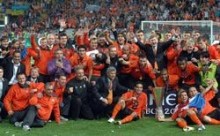On May 20, 2009, a historic event for the Ukrainian soccer took place in Istanbul, Turkey. For the first time a soccer team representing independent Ukraine won the UEFA Cup. Defeating Werder (Bremen, Germany) 2:1 in extra time Donetsk’s Shakhtar became the holder of the last UEFA Cup in history.
The sniper kick of Shakhtar player Jadson, which secured Shakhtar’s victory in this year UEFA Cup final, was the result of many years of work aimed just at that target. Few people remember that Shakhtar’s owner, Rinat Akhmetov. declared the UEFA Cup his team’s aim ten years ago. Since then the generous owner of the club has spared neither money nor efforts to achieve the goal. Not only the players and coaches of the main squad, but all the club structures from junior soccer schools to training facilities have received all they needed and more. It is quite symbolical that the European trophy was won by Shakhtar a few months prior to the grand opening of the new stadium, which promises to be one of the best soccer arenas in Europe.
It is clear now that the great international success was achieved, above all, owing to the consistency of FC Shakhtar’s policy. Romanian coach Mircea Lucescu has been working with Shakhtar for five years now, building a team of players from all over the world and taking advantage of the generosity of the club’s president, who was willing to pay the price for top-performing players.
There have been victories and failures since then. However, the coach and the players have always felt they are trusted. They have always been sure that the team will achieve the international acclaim they have dreamt about — if not today, then tomorrow, if not tomorrow, then The Day after tomorrow.
The success came on May 20. Virtually all the circumstances that day were in Shakhtar’s favor. Unlike its rivals, who lacked their best striker Diego due to suspension, all the leading players of the Donetsk team, except Czech H bschman, were not only fit but tuned to winning that particular game. Pyatov, Srna, Chyhrynskyi, Kucher, Ra , Fernandinho, Jadson, Ilsinho, Lewandowski, Willian, and Adriano were Shakhtar’s starters, who ensured their team’s advantage and, eventually, victory by giving their all at their designated positions.
Despite the dramatic development of the events in the game, which was watched by millions around the world, it was obvious that Shakhtar was better prepared for it. The Donetskers had the ball in their possession more, attacked their rivals’ goal more often, and had more chances to score. Just two of them ended in goals. The first one was scored by Luiz Adriano in the first half, while the other one — by Jadson in extra time, which followed a 1:1 draw in the main time.
Shakhtar triumphantly concluded the nearly forty-year history of the UEFA Cup, which will be transformed into the Europa League next season.
Shakhtar’s victory testifies to the high level of the best teams of Ukraine’s championship. However, this success can hardly be called a triumph of Ukraine’s soccer as such. Shakhtar showed an example of how international success can be achieved on the basis of enormous investments and full support. There are no other soccer clubs in Ukraine that come close to Shakhtar in terms of structure and budget.
Twenty-three years ago Dynamo Kyiv won the UEFA Winners’ Cup, the last international trophy for Ukrainian teams. Then the entire squad could have represented the country in the World Cup, while today the players of Shakhtar cannot do that. In order to win the UEFA Cup, Shakhtar had to use foreign players, who constituted the majority in the team’s winning line-up. The Shakhtar of today may even be stronger than Ukraine’s national team, and this fact brings little comfort.
We are left to hope that the European achievement of the Ukrainian team will popularize soccer in Ukraine even more, and the generation of the Ukrainian boys who will follow the examples of Srna, Fernandinho, or Jadson will produce new soccer stars in the same league with Andrii Shevchenko, our latest world-class soccer star.
Returning to Shakhtar, on May 31 the team has a chance of adding Ukraine’s Cup to its European counterpart and in August, the UEFA Super Cup in a matchup with the winner of the Champions’ League. And then Ukraine may receive another European soccer trophy! In August and September 2009 five more Ukrainian clubs will participate in European soccer competitions for the first time. Let us hope that they will be successful.








